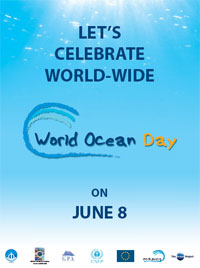"Our Oceans, Our Responsibility”
8 June: World Oceans Day

The world's oceans cover more than 70% of our planet's surface and the rich web of life they support is the result of hundreds of millions of years of evolution.
The concept of a "World Ocean Day" was first proposed in 1992.
In 2008, the United Nations General Assembly decided that, as from 2009, 8 June would be designated by the United Nations as “World Oceans Day”. Several activities are planned this month for UNESCO Intergovernmental Oceanographic Commission (IOC), beginning with a press conference on the high seas!
The oceans are essential to food security and the health and survival of all life, power our climate and are a critical part of the biosphere. The official designation of World Oceans Day is an opportunity to raise global awareness of the current challenges faced by the international community in connection with the oceans.
Why is it important to celebrate "World Oceans Day"?
- To change the way we look at oceans
- To use the opportunity to learn more about the oceans
- To do something positive for the oceans

Did you know that:
- Oceans cover about two-thirds of the Earth's surface and help create an atmosphere in which plants, humans and animals can live.
- Oceans are the planet's life-support system, absorbing consuming carbon dioxide and producing between one-third and one-half of the world's oxygen.
- These great bodies of water impact our weather and climate.
- Finally, as home to thousands of species of fish and invertebrates, oceans provide an important part of the global food chain. Both marine mammals and humans depend heavily on healthy on healthy fishes and healthy oceans for food. Unless the oceans remain healthy, whales, dolphins, other marine mammals - and even people - will not survive.
Related links:
:: Intergovernmental Oceanographic Commission (IOC)
:: What will happen in 2009? (More)
:: Interview with P. Bernal (video)
:: Maud Fontenoy, Spokesperson for the Ocean (More)
:: IOC's Message for UN World Ocean Day (More)
:: Photo Gallery (More)
- Source:UNESCO SC
- 08-06-2009

